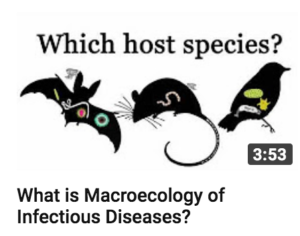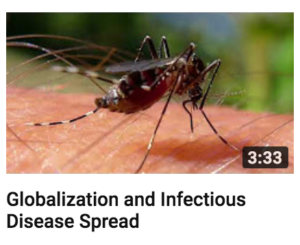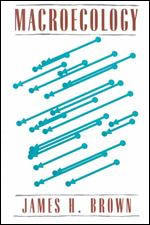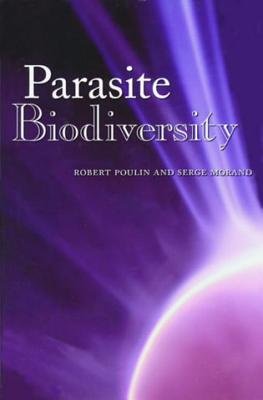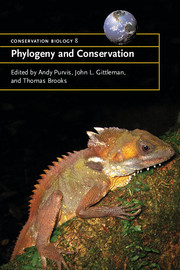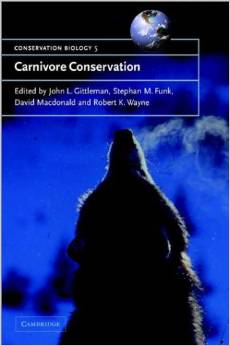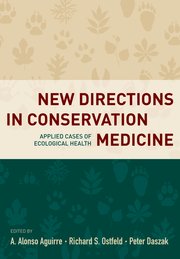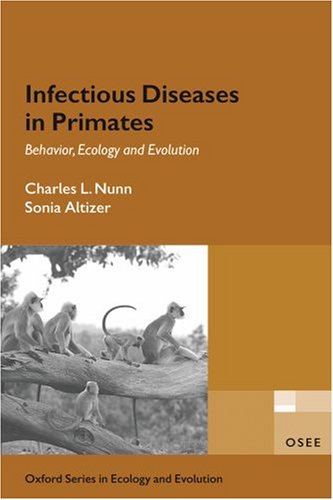Software
helminthR allows for the programmatic access of London Natural History Museum’s helminth database. This extensive database is composed of over 250,000 host-parasite occurrence records from all over the globe.
Author: Tad Dallas (Louisiana State University)
insectDisease allows for programmatic access to the Ecological Database of the World’s Insect Pathogens (EDWIP). The EDWIP data consist of experimental infections and field observations of the interactions between insect hosts and a number of bacterial, fungal, nematode,46protozoan, and viral pathogens, as well as information on their ecological characteristics.
Authors: Tad Dallas (Louisiana State University), Colin Carlson (Georgetown University), Patrick R Stephens (Oklahoma State University), Sadie Jane Ryan (University of Florida), David Onstad (Corteva Agroscience)
Videos
What is the Macroecology of Infectious Disease? What is macroecology, and what can it tells us about infectious diseases? This video reveals how a macroecological approach has the potential to revolutionize our understanding of disease diversity and distributions across the globe.
Produced by: Ania Majewska (University of Georgia)
Globalization and Infectious Disease Spread. This video describes how globalization is allowing new disease to spread from wildlife to human populations worldwide, using chikungunya as an example.
Produced by: Ania Majewska (University of Georgia)
Creature Cast. Human health, animal health and global environmental change inextricably intertwined at global scales. This short video Introduces the One Health perspective.
Produced by: Jessica Fields, Kate Smith (Brown University)
R tutorials
These short tutorials guide users through some of the specialized methods implemented in the R statistical computing environment that we have found useful in our research. We also provide a short introductory tutorial to R itself for newer users, the other tutorials assume that users are familiar with the terms and techniques it discusses. These tutorials are intended as first steps that will help users get their feet wet, not as full courses. However, each tutorial is suitable for use as the basis of a hands on computational lab of roughly a few hours.
R Basics: We used this introduction to R for several years as part of the Population Biology of Infectious Diseases REU program. It introduces users to R and R studio, common R objects as some basics of R programming. Download R Basics here (contains pdf lesson and a script with code from the tutorial).
R Phylo Basics: this tutorial introduces users to using phylogenies in R. It includes basic tree manipulations, how to align a morphological data set with a tree, one widely used method for testing traits for phylogenetic signal, and some simple techniques for ancestral character reconstruction. Download R Phylo Basics here (contains pdf lesson and data sets needed for the tutorial).
R Network Basics: this tutorial introduces users to some basic network terminology and operations using the “igraph” library. Download R Network Basics Here (contains pdf lesson, R script with code, and a data file needed for the tutorial).
Intro to the GMPD: This extremely short (can be completed in less than an hour) tutorial introduces users to the Global Mammal Parasite Database v. 2.0. It illustrates importing data using the “read.csv” command, some simple manipulations of a large data set, and how to build a map using coordinate data from the GMPD. Download GMPD Basics (contains pdf lesson, R script with code, and data files needed for the tutorial).
Power Point Summaries
These power point presentations are designed to make some of our published work more accessible to the public. The slides contain notes summarizing some of the motivation and primary findings of the work highlighted. The slides can also be used as aids to discuss RCN related topics in lectures.
Power Point Summary of Teitelbaum et al. 2018 “Migratory behaviour predicts greater parasite diversity in ungulates” Proceedings of the Royal Society B.
Power Point Summary of Han et al. 2016. “Global Trends in Zoonotic Disease in Mammals.” Trends in Parasitology.
Coming soon: Park et al. 2018. Characterizing parasite generalism illuminates patterns of host-parasite associations.
Produced by: Sara Heisel (University of Georgia)
Additional Educational Materials
Host traits and parasite biodiversity. This module contains all of the material needed to incorporate a unit on host traits and parasite diversity into an undergraduate course focused on biodiversity, conservation, disease ecology or macroecology. It includes a lecture on parasite biodiversity with accompanying notes and all of the data and R code needed to conduct a lab exercise. During the lab exercise students will use data that is provided and from online databases with computational analytic tools to: (1) learn how to synthesize large data sets to answer broad scale ecological questions, (2) develop and test hypotheses by performing statistical analyses to investigate the relationship between parasite diversity and sampling effort, host ecological traits and host extinction risk.
Authors: Shan Huang (Senckenberg Biodiversity and Climate Research Centre, Germany), Carly Strasser (Data Observation Network for Earth, University of New Mexico), Stephanie Hampton (Center for Environmental Research, Education and Outreach, University of New Hampshire), and Sonia Altizer (Odum School of Ecology, University of Georgia)
Global Homogenization of Disease. This power point presentation includes material that can be used to develop a lecture on disease globalization.
Author: Kate Smith (Brown University)
Books by RCN Participants
